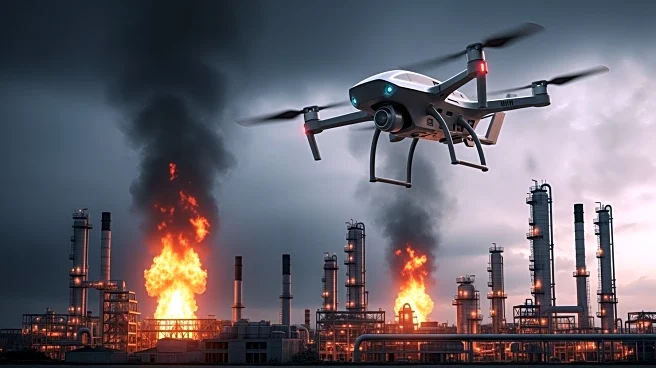What's Happening?
Ukrainian President Volodymyr Zelensky has intensified drone attacks on Russian oil facilities, targeting refineries, depots, and terminals. These actions have led to a significant decrease in Russian fossil
fuel exports, which fell to their lowest point since the beginning of the conflict. The Centre for Research on Energy and Clean Air reported that Russia's fuel exports averaged $637 million per day in September, marking a 4% decrease from August and a 26% drop compared to September 2024. Zelensky has described these attacks as effective sanctions against Russia's war efforts. The drone strikes have notably impacted key oil terminals in Crimea and other major refineries, disrupting crude oil production.
Why It's Important?
The reduction in Russian fossil fuel exports due to Ukraine's drone attacks has significant implications for the global energy market and geopolitical dynamics. Russia's economy heavily relies on fossil fuel exports, and the decrease in revenue could weaken its ability to sustain military operations in Ukraine. Additionally, countries like China and India, major importers of Russian oil, may face challenges in securing energy supplies, potentially leading to shifts in trade relationships. The European Union's recent proposal to ban pipeline and LNG imports from Russia further underscores the international community's efforts to curtail Russia's economic power and influence.
What's Next?
The ongoing drone attacks by Ukraine are likely to continue, as Zelensky has expressed intentions to maintain pressure on Russian oil infrastructure. The EU's draft proposal to ban Russian energy imports starting January 2026 could further impact Russia's economy. President Trump has urged NATO members to cease purchasing Russian oil, which may lead to increased diplomatic efforts to isolate Russia economically. The situation remains fluid, with potential for further escalation in military and economic strategies by both Ukraine and Russia.
Beyond the Headlines
The strategic targeting of oil infrastructure by Ukraine highlights the evolving nature of modern warfare, where economic sanctions and resource control play crucial roles. This approach raises ethical questions about the impact on civilian populations and global energy security. The long-term effects on Russia's economy and its geopolitical standing could lead to shifts in alliances and power dynamics in the region.










